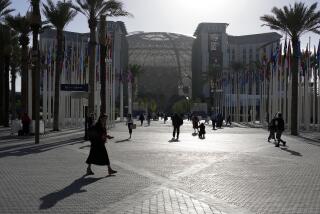In Beijing, the Stress Will Be on Normalcy : Beset by Crises, Gorbachev and Deng Will Stick to Fence-Mending
- Share via
The most interesting conversation at next week’s Sino-Soviet summit in Beijing will probably never take place, as Soviet leader Mikhail S. Gorbachev and his Chinese counterpart Deng Xiaoping will skirt the crucial but delicate problem they have in common--how to proceed with economic and political reform without losing control.
What we will be treated to, instead, is one of the grand media events of the decade, perhaps of the last quarter-century, rivaling Richard M. Nixon’s opening to China 17 years ago. The meeting will symbolize the transformation of three decades of bitter hostility into a “normal” relationship, capping a process actively under way since Gorbachev came to power.
Both sides will stress the positive, although, as usual, the Soviets will be more exuberant than the Chinese. Moscow will emphasize the reduction of military forces along the 4,700-mile-long border, progress on (though probably not completion of) a border demarcation agreement, their common dedication to world peace and disarmament and the cause of Third World nations, and the fact that economic relations between these two large socialist countries are growing rapidly. And, they will stress, in no case will the Sino-Soviet alliance of the 1950s be resumed; instead, relations will be based on the five principles of peaceful coexistence. Perhaps most important to some in the Kremlin, party-to-party relations will be “restored” when Gorbachev meets with Chinese General Secretary Zhao Ziyang.
The Chinese will not disagree, but they will tell people that normalization--even of party-to-party relations--does not by any means imply that all problems have been eliminated, nor will they be soon. The “three obstacles” that China identified in the past as blocking normalization have not been fully resolved in Beijing’s view: Soviet troops may be out of Afghanistan, but Moscow continues to provide military aid to Kabul and to threaten China’s friend Pakistan; Vietnam may be about to pull its forces out of Cambodia after a decade of occupation, but then again it may not--it certainly is not to be trusted; and though Moscow has pledged to pull 200,000 troops out of its Asian regions (including three-fourths of the Soviet forces stationed in Mongolia), the Kremlin may well leave in place an infrastructure that would facilitate redeployment on short notice. Besides, many Chinese will point out, whatever the prospects for success of perestroika and Moscow’s need for a breathing space in the short run, the Soviet Union has not abandoned its long-term hegemonistic ambitions.
So, the Soviets will oversell the significance of the meetings and the Chinese will undersell it. No matter. The fact is that the threat of war between them has virtually evaporated for years to come--the border is not only untroubled, but also the scene of bustling local trade. Thus it is appropriate for these neighbors and erstwhile allies at least to bring their political and economic relations back to a level of normalcy. And it is important to do it while Deng, the only Chinese leader capable of fully authenticating normalization, is still alive.
Ironically, the meeting with Gorbachev may be at least a marginal element in fostering domestic political change in China. Though visas are being limited for news media coverage of the summit, the prospect of world attention focused on the Chinese capital has probably influenced Deng and company to take a more tolerant line than their instincts would normally have permitted toward student demonstrators who have pressed for democratization in recent weeks. Less clear is whether the Chinese leaders will see in this restraint not just necessity, but the virtue that Gorbachev apparently does in his own case, as he promotes glasnost and open expression of dissent to enlist the masses against recalcitrant political and bureaucratic actors.
Whether Deng and Gorbachev exchange notes on such sensitive issues or not, they approach this historic meeting with a shared understanding that the first priority for each of them is economic reform supported by some sort of political change. The implication for their bilateral relations is that peace and stability are first-order requirements.
Over time, the United States and other nations will have to deal with the consequences of Chinese and Soviet success or failure in their respective reform efforts. But whether, as I believe, the problems of success are likely to be far less troublesome for us than those of failure, outsiders can have only a marginal impact in any case. For the moment, the relevant point is that Sino-Soviet normalization is moving ahead, that it will be kept within reasonable limits, that it will contribute to world stability and that, even if it somewhat complicates our alliance relationships in Asia--just as Gorbachev’s policies in Europe are doing there--Americans should view it with hope rather than with fear.
More to Read
Sign up for Essential California
The most important California stories and recommendations in your inbox every morning.
You may occasionally receive promotional content from the Los Angeles Times.













